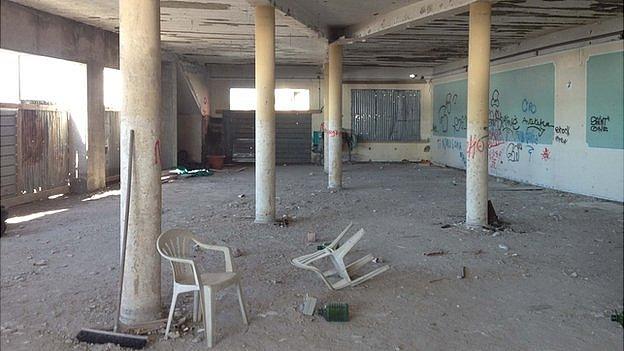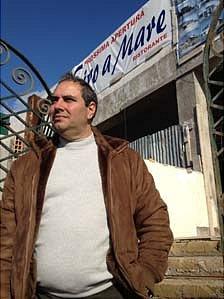Naples' Camorra faces resistance from businesses
- Published

The Ciro a Mare restaurant which is being rebuilt after an arson attack
Small, with grey hair and now 70 years old, Raffaella Ottaviano is not the most likely looking heroine.
But there was a moment when she confronted the Camorra - the formidable Neapolitan mafia.
She made a stand, and launched a movement to drive the gangsters out of her community.
It all began when some Camorra men walked into Mrs Ottaviano's clothes shop on a street in Ercolano, a town on the outskirts of Naples.
"You know why we're here," they said. They had come to demand what's known as "il pizzo" - protection money.
Ruthless
For generations, the Camorra has extracted payments from shopkeepers, and bar owners and other small businesses in Ercolano and all across the region.
.jpg)
Raffaella Ottaviano, who said no to the Camorra
But Mrs Ottaviano decided that she would not hand over her money.
"Listen, please be kind and get out immediately, I have no intention of paying," she said, remembering her exchange with the men.
"And they said, 'But do you realise what you're doing?' And I said: 'I'm not interested. Just get out!'"
The Camorra has been described as Italy's most bloody and ruthless mafia. And very often its victims chose to say nothing.
But Mrs Ottaviano broke the silence.
She went to the police, and from photographs she identified the men who came to her shop. Soon they were arrested, and Mrs Ottaviano needed protection.
"For a year and a half, I was alone with the policemen, who never left me," she said.
But gradually, other shopkeepers in Ercolano began to follow her lead and refuse to pay the Camorra.
There were just two or three at first, and then a few more. But they would meet secretly and eventually they formed an association with the help of the local council.
That was back in 2006. And in the years since, their movement has grown in size and strength and determination.
'No more fear'
More than 80 businesses now refuse to pay the Camorra - and all the time more join the association.
But even now, does Raffaella worry that the Camorra might exact violent revenge for her defiance?
"I am calm," she says. "I don't even wonder about that. I wouldn't be able to live otherwise.
"There is no more fear now. We are all united. We couldn't go on like that.
"We must fight the Camorra. Not just with talk, but with action - with action."
Sometimes, though, the Camorra does punish those who defy it.
At Portici, not far from Ercolano, Raffaelle Rossi has a restaurant, called the Ciro a Mare.

Raffaele Rossi insists he will not give in to the Camorra
Its location is perfect: down on the shores of the Bay of Naples, with a view of the island of Capri.
And the restaurant flourished, until the Camorra took an interest.
The gangsters demanded 50,000 euros (£41,700; $66,000) a year in protection money. Mr Rossi said no.
First, the restaurant's windows were shot at. Then, one night after Mr Rossi had closed up, a bomb was placed in the entrance.
Next, two men on a motorbike fired at him in his car. And finally, the restaurant was set ablaze.
But standing in the shell of what was his business, Mr Rossi said that he would rebuild and reopen. And even although he is afraid, he says he will not pay the Camorra.
"We're human," he said. "We cannot deny the fear that we feel even today. Much fear. But we do have to destroy this kind of pressure."
Arrests
The shopkeepers of Ercolano believe that they are winning.
In her bakery, Sofia Ciriello withstood intense pressure from the Camorra and refused to make the pizzo payments.
"People have to free themselves from this slavery and oppression - regain their dignity because things are not like they used to be," she said.
And what has been achieved in the town has not only been based on the courage of its shop owners.
They have been strongly supported by the police. Dozens of "Camorristi" have been arrested for attempted extortion.
And the local authority has backed those who stood up to the gangsters.
It is believed to have been the first council in Italy to offer tax breaks to businesses that go to the police, instead of paying.
"What is happening in Ercolano is extraordinarily important," said Rosario Cantelmo, an anti-mafia prosecutor in Naples.
He said that until two years ago, many businessmen were still refusing to admit that they were submitting to the gangsters' demands.
They would stay silent even when threatened with prosecution for "assisting a criminal organisation".
"Today, instead, unexpectedly, for a series of reasons, there is a new culture," Mr Cantelmo said.
"These people gained courage, went to the police, and complained about the extortion."
Mr Cantelmo said he had never seen anything quite like it the region.
And he believes that the gangsters are worried.
"They are facing a reality with which they are not familiar," he said.
"It never used to be that people would - in front of a judge - look them in the face and accuse them without fear.
"We haven't completely eradicated the Camorra issue in Ercolano. We haven't won the war yet, but we are winning many important battles."
- Published11 October 2011
- Published13 July 2011
- Published24 June 2011